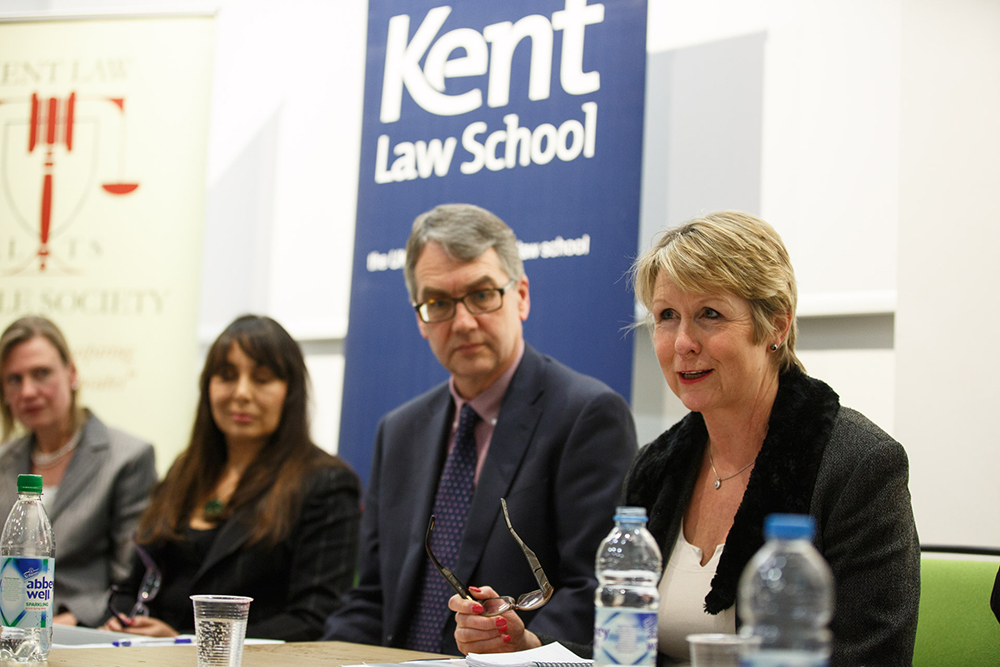Questions on the ‘snooper’s charter’ and Ched Evans’s right to work were amongst many fielded by a prestigious panel of legal experts at the first Law Question Time held at Kent.
Along with Her Honour Judge Heather Norton, a Circuit Judge at Canterbury Courts, the panel comprised: Mikal Anderson, solicitor for the Social Welfare Team at Kent County Council (KCC); John Bowers QC from Littleton Chambers, a specialist in Employment and Human rights law and a Deputy High Court Judge; Elizabeth Howe OBE, General Counsel with the International Association of Prosecutors; David Radlett, Law Lecturer from Kent Law School with public and criminal law expertise; and Ross Talbot, a barrister from Lamb Building (Temple).
The first question from the audience of students, alumni and visitors, was made in light of recent legal aid cuts, querying whether the post of Lord Chancellor should be appointed to a lawyer or a non-lawyer. Whilst not expressing particularly strong preferences, the panel were largely in agreement that the real issue at the heart of this question was the problem of access to justice and a view that justice is best served when people on both sides are best represented.
A debate following a question about the possible future fusion of the role of solicitors and barristers, revealed a divided panel. While some believed a natural division of roles exists, with potential conflicts of interest cited as a reason to keep them separate, others argued that many Commonwealth countries already have a joint profession and that an increasingly interchangeable profession is an inevitable development.
Other questions posed by the audience included how increased self-representation of clients in courts could impact the quality of justice, and whether, following the recent attacks on the offices of Charlie Hebdo in Paris, Parliament should vote for a return of the ‘snooper’s charter’.
One of the final questions of the night, prompted by the recent conviction for rape of former Premier League footballer Ched Evans, generated an interesting discussion of whether he had a right to resume his career in football. Whilst not all agreeing that footballers are role models, the panel generally felt this was an ethical issue rather than a legislative issue.
Kent Law School Professor Nick Grief, who chaired the debate, revealed he had been inspired by the discussions about Ched Evans to create a new seminar question for his EU Law module.
The event, brainchild of panellist Ross Talbot, was coordinated by the Law Schools Employability and Career Development Officer Jayne Instone in association with the Kent Student Law Society, Kent Law Temple Society and Kent Critical Law Society.
President of the Kent Student Law Society, Andrea Constantine, said: ‘The first Law Question Time at Kent was a fantastic opportunity for students to hear professional opinions of the big legal issues facing the UK today; whilst it was great to have a varied panel of six renowned legal professionals, it was also impressive to hear the questions posed by students, who showed off a strong grasp of what is going on in the legal sphere, outside of what is usually discussed in seminars and lectures.
‘The event was a good opportunity to encourage debate on topical issues amongst both groups, with issues ranging from litigants-in-person to Chris Grayling, from a snooper’s charter to Ched Evans. Networking with the professionals after gave us the opportunity to further such discussions in a more sociable atmosphere.’

